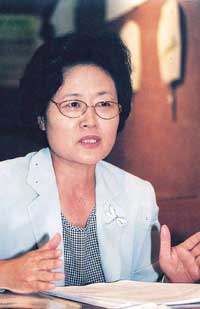
Civic groups in both North and South Korea have been steadily breaking the grounds for inter-Korean reconciliation. In 2001, the first anniversary celebrations of the June 15 Inter-Korean Joint Declaration was held as a joint event on Mt. Kumkang, and the August 15 celebrations were also held in Pyongyang in the form of the National Reunification Festival. Another National Reunification Festival was held on Mt. Kumkang this year in celebration of the second anniversary of the June 15 Joint Declaration. Workers and farmers of the two Koreas have already held their own rallies this year. So to date, there have been several large joint rallies at the civilian level, with participation ranging from 700 to some 1,300.
Events that the Korean people could have only dreamt of before the June 15 Joint Declaration are quietly taking place on the Korean peninsula. It was thanks to the strong trust and friendship built through these events that the Liberation Day celebrations concluded on a successful note despite the skirmishes caused by the recent naval clash along the NNL. Come October, civic groups will be holding the Inter-Korean Women's Reunification Festival and the Youths and Students' Festival, giving greater depth to the meaning, scope and quality of inter-Korean civilian exchanges.
The civilian exchanges and joint Liberation Day celebrations in Seoul this year took place under severe restrictions. It is only a beginning, and its impact on the general public is only skin-deep. But its effects and historic significance can hardly be underestimated. Most noteworthy is the fact that civic groups in North and South Korea are now directly involved in clearing out the era of confrontation and opening a new era of reconciliation. In the past two years, civic groups have succeeded in holding six meetings, large numbers of civilian leaders have taken turns to visit the two capitals, and two more large-scale joint events are scheduled later this year. Civilian exchanges between the two Koreas have quietly formed their own tide.
Unlike inter-governmental dialogue, civilian exchanges have made the era of reconciliation between the two Koreas a fact of life, an inexorable reality. Moreover, the 2002 Seoul National Reunification Festival took place immediately after rash battle calls triggered by a military collision had wreaked havoc on South Korean society, thereby reopening the floodgates for the once stalled inter-Korean relations. Ceaseless efforts towards reconciliation at the civilian level have now become an irreversible current that goes from strength to strength. Right after the last working group meeting on Mt. Kumkang in preparation for the Seoul Festival, the DPRK expressed its regret concerning the naval clash in the West Sea and volunteered a wide range of exchanges including government dialogue, reunion of separated families and joint sports events.
Another important thing to note about the civilian exchanges and joint celebrations in Seoul is their diplomatic and political significance. By proving the Korean people's united aspirations towards peace and reconciliation at home and abroad, the recent celebrations have put both damper and stopper on any attempts to create military tension or war on the Korean peninsula. This is of particular significance considering the urgency of the political situation surrounding the peninsula. Many experts have predicted a serious threat of war on the peninsula in 2003. Dialogue between the DPRK and US has stalled, and the Bush administration has openly criticized the DPRK as 'an axis of evil.' Dire forecasts of an extended anti-terrorism war, preemptive attacks, small nuclear weapon deployment and surgical attacks have become topics of open policy discussions. On top of this, the year 2003 is the end of the moratorium on the DPRK's missile program as well as the deadline for the completion of the light water reactors the US promised to build. There has been a delay in the completion of the light water reactors, heightening the possibility of rising tension between Washington and Pyongyang in 2003. The international community is buzzing with rumors that the next American target after Iraq will be the DPRK. Washington has openly declared that its agenda for negotiations with Pyongyang will encompass nuclear, conventional and biochemical weapons and even touch on North Korean human rights, sinking hopes of a smooth resolution of the conflict between the two nations.
Against this backdrop, the recent display of close exchanges and reconciliation efforts between the two civil societies on the Korean peninsula is a declaration of the resolute will of the Korean people in repelling all attempts at war and protecting peace for ourselves. It is an undeniable message to the world that the Korean people are putting an end to the era of war and confrontation and opening a new chapter of peace and reconciliation. It is an undeniable message to the world that the Korean people have taken the matter into our own hands to sweep out the era of division and dispute forced on us by foreign powers and to usher in the era of lasting peace.
Civilian exchanges between the two Koreas have only just begun, and are still fraught with limitations. Government authorities have yet to lessen their control, severely restricting civic groups' room for maneuver. But one thing is clear: no matter how great the difficulties and inconveniences that lie ahead, the civil society's march towards peace and reconciliation must become an irreversible current, for this is the only way to protect the belatedly blossoming peace on the Korean peninsula.
War takes its greatest toll on women. Therefore women must no longer keep their silence but become actively involved in the process of national reunification.

